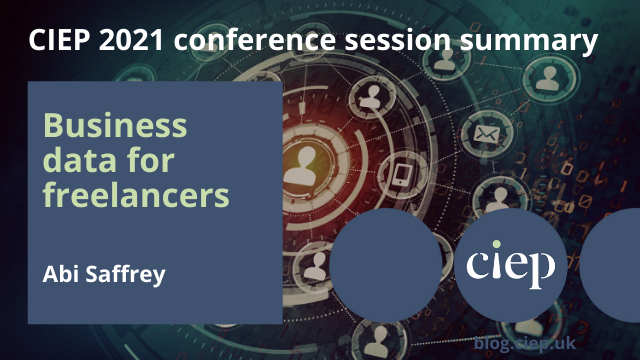This year’s CIEP conference was held online, from 12 to 14 September. Attendees from all over the world logged on to learn and socialise with their fellow editors and proofreaders, and a number of delegates kindly volunteered to write up the sessions for us. Abi Saffrey reviewed Business data for freelancers, presented by Maya Berger.
 Knowledge (about your business) is power
Knowledge (about your business) is power
‘Business data is the key to making informed decisions.’
Maya Berger is an experienced freelance editor who loves data, and in this session, she highlighted the importance of gathering data and then using that data to make smarter business decisions and meet business goals. Maya highlighted a few areas where freelancers can record information and use it to answer specific questions.
Tracking your time
- How many days off have you taken this month/season/year?
- How many sick days?
- How many weekend days have you worked?
- How many hours are you working each day/week/month?
- When are the busy times?
- How many days off do you want next month/season/year?
By tracking hours and days worked, you can identify whether you have the work–life balance you want, whether you need to set/adjust boundaries, or whether you can take action to enable you to work fewer hours or on different days.
CPD
- How does the content within a CPD activity relate to the editorial work you do and the way you run your business?
- Is the time spent on the activity proportional to how much it’s going to help you and your work?
- How do you change your working practices/approach after undertaking a CPD activity?
Tracking the hours spent on watching webinars and reading blog posts – and the topics they cover – can show that too much time is being spent on one topic that may not be directly relevant to your work. Or not enough learning or practice time is being allocated to a tool or issue you deal with every day.
Job satisfaction
- Are the projects you’re working on moving you towards a desired goal?
- How many of your projects are in a subject area you are interested in?
- Which projects drain you or engage you?
- What kind(s) of work can you look for that will improve your job satisfaction?
- Have you taken enough time off to stay energised and motivated?
Business expenses
Freelancers must record allowable business expenses for the tax authorities.
- Are you subscribing to a tool or service you rarely use?
- Is there a paid-for ad-free version of an app that you use every day?
- Do you use a tool/service more for personal tasks than for work ones?
Knowing what you’re spending your money on can provide the momentum to cancel a subscription, or invest in something that will make each project go more smoothly.
Rates/fees
- Do you earn enough to cover your living (and business) expenses?
- Do your rates reflect the work done, and your skills and expertise?
- Do your rates cover the time spent on querying, invoicing, communicating and logging the project details?
With this information, you can make an informed decision about raising your rates, and ensure that you build admin time into quotations and fees.
Income
- How much did you quote?
- How much money did you receive?
- How many hours did you estimate the work would take?
- How many hours did the work actually take?
- Was the money worth the time and effort?
- Were there any other benefits or costs?
- How many projects has a client offered you over a year? How many did you work on?
Client data
- Where did you find your client?
- How did you approach them? Did it get you work?
- Where did your client find you?
- Why did they approach you?
- Did they provide feedback?
- Do they want to work with you again?
It’s possible to collect a huge amount of data about our businesses – we can harness that information and turn it into practical actions and goals, rather than leaving it in a file somewhere to gather dust. The information can help us to understand our value and present that to existing and new clients. It’s good to start small with a spreadsheet or two. Maya set attendees the challenge of tracking one new aspect of their business over the next week; I was still in a post-conference daze and didn’t manage it, but the session’s given me loads of ideas for what to look at over the coming months (and I’ll record how long I spend tinkering with my spreadsheets).
Maya has created a suite of integrated Excel spreadsheets for freelance editors, for the easy management of income, expense and project data: The Editor’s Affairs (TEA).
 Abi Saffrey has enjoyed using spreadsheets for over 20 years. She’s an Advanced Professional Member of the CIEP, offering editorial project management and copyediting to a variety of organisations that publish digital and printed content.
Abi Saffrey has enjoyed using spreadsheets for over 20 years. She’s an Advanced Professional Member of the CIEP, offering editorial project management and copyediting to a variety of organisations that publish digital and printed content.
 About the CIEP
About the CIEP
The Chartered Institute of Editing and Proofreading (CIEP) is a non-profit body promoting excellence in English language editing. We set and demonstrate editorial standards, and we are a community, training hub and support network for editorial professionals – the people who work to make text accurate, clear and fit for purpose.
Find out more about:
Posted by Abi Saffrey, CIEP blog coordinator.
The views expressed here do not necessarily reflect those of the CIEP.
